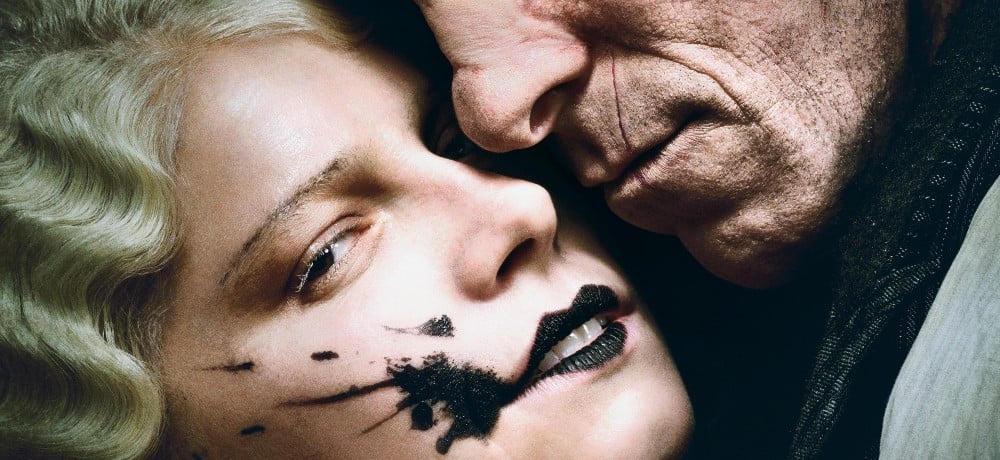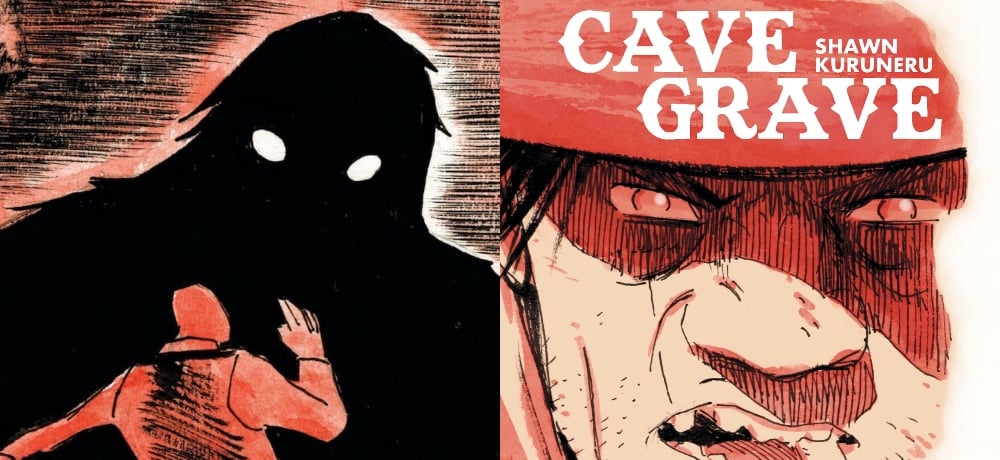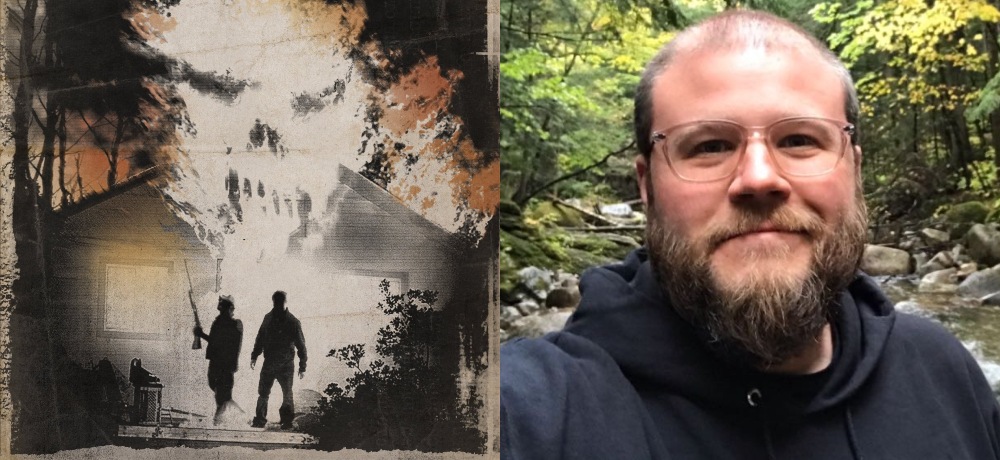






Welcome back to a new Let’s Scare Bryan to Death, where we’re diving into a freaky whirlpool of addiction, cosmic horror, and meta discussions about storytelling as we explore Justin Benson and Aaron Moorhead’s debut feature, Resolution. Joining me for this surreal journey is Philip Yount, a graphic designer, metalhead, and cosmic horror enthusiast whom you likely know from the great Dead Ringers podcast (regulars may remember we had founder/co-host Nolan McBride on for a discussion on Lake Bodom). You can also catch Philip on his Twitch channel, where he’s likely painting fantasy miniatures or playing the odd game or two.
It was actually while guesting on a recent episode of Dead Ringers that I revealed myself to be unacquainted with the work of Monsieurs Benson and Moorhead, and since I’d already been looking for an excuse to chat with Philip about a movie and he’s a big fan of their filmography, it seemed only proper for us to get together and talk about their first film.
Resolution follows Mike (Peter Cilella), who, after receiving a mysterious email containing footage of his best friend, Chris (Vinny Curran), in the throes of drug addiction, goes to Chris’ house in a last-ditch attempt to get him into rehab. When Chris refuses, Mike handcuffs him to the house to get him to detox, promising to stay with him until he gets through his withdrawal symptoms. A variety of complications arise, including the drug dealers (Kurt David Anderson and Skyler Meacham) demanding the drugs they gave Chris to hold and Charles (Zahn McClarnon), the owner of the indigenous reservation land on which Chris is squatting, who demands they both get off his property.
But the biggest wrinkle comes in the form of a mysterious entity who starts planting footage around the property of other people who met grisly ends in the area, followed by clips of Mike and Chris that seem to be steering them toward an unknown endgame. As Mike becomes progressively more obsessed with this entity (whom Philip aptly refers to as “the Watcher” below), his plan to save Chris and even his own sanity seems to be spiraling out of control.
As always, we’ll be getting into spoiler-heavy territory as the discussion progresses, but first Philip, tell me a little bit about the first time you saw Resolution. Is it the first Benson and Moorhead film you ever watched?
My first exposure to Benson and Moorhead and first time watching Resolution was for Dead Ringers! We paired it with Cabin in the Woods for our fourth episode way back in October of 2017. I was still very early in my journey with horror films outside of the odd few favorites, so it was exciting to see such a clever and well-constructed metanarrative take on cosmic horror in this low-budget indie package. It went beyond the typical ‘weird tentacle monster’ tropes and was much more cerebral and existential; that was really appealing to me. I then had a chance to see their follow-up, The Endless, at the Knoxville Horror Film Festival a few weeks after the recording session, which was an incredible experience. I’ve been a Benson and Moorhead fan ever since.
Chris’ detox narrative is tricky given that Benson and Moorhead had no direct experience with addiction, but I think they were smart in approaching it from the point of view of a character who himself had no experience with addiction. How well do you think that element works, and how does it connect with the supernatural elements of the movie?
I agree that keeping the primary focus on Mike was the right choice, and it makes sense to me for them to approach Chris’ struggles from that perspective. Since Mike has presumably never dealt with this sort of thing before either, it’s easy to relate to his intentions, if not his harebrained methods, and directly correlate the things he studies to prepare for this detox with the kinds of research the directors would have looked into when preparing for the film.
I’m fascinated by the ways the detox narrative ties back into the cosmic, supernatural elements of the movie. The characters’ actions, especially Mike’s, reflect the manipulations of the Watcher. Mike traps Chris in this house, slowly introducing new things to coax him along as the days go by. He tries to help (read: forces) Chris to change the course of his life and his outcome, encouraging him to go to rehab, turn his life around, and find his happy ending. As things unravel and become stranger around Mike and Chris, the dawning revelation that the Watcher is doing the exact same thing, trapping them there, introducing new layers, discoveries, and conflicts of its own for the sake of having its own good story is powerful and oppressive. It’s a brilliant metacommentary on storytelling, filmmaking, our role and influence as the audience, and the messiness of actual life for people in these sorts of situations.
Can you talk a little bit more about the metacommentary at play, because it’s quite interesting. There seem to be elements of conflict between the storyteller and the characters, where the storyteller is trying to coax a narrative that doesn’t always fit how the characters are developing.
I feel the metacommentary is rich and works on several levels. On the surface, I think it speaks to tropes in storytelling, specifically in this case for a horror audience. As Mike stumbles on these collections of events captured on progressively more modern forms of media, the stories seem to follow similar sequences of unfortunate events leading to a grim end. These similar tales—along with the influences and events injected into Mike and Chris’ narrative by the Watcher—seem to suggest that these things are not only expected but are required to happen to make it successful and satisfy the audience.
On a deeper level, I feel that it speaks to the stories we tell ourselves about ourselves and others in the face of reality. Sometimes people, circumstances, and relationships are just messy, and our intentions and perceptions can be skewed. It can lead us to create these narratives out of happenstance to give our lives meaning, even though on a broader, cosmic scale we don’t really have any control over where the story goes.
Is it just me, or is Mike kind of terrible? I appreciate that he’s trying to help his friend, but there’s a distinct narcissism to his approach. Did you get that sense as well, and if so, do you think that’s a deliberate character choice by Benson and Moorhead?
I always got the impression that Mike’s methods are born out of a last-ditch, desperate effort to save Chris’ life, but yeah what he does is pretty damn awful! I think it’s clear that he knows what he’s doing is excessive (he lies constantly to his wife about how he’s going about all this), and it really doesn’t matter whatever good intentions he has. No matter how you square it, he still manages to tase a man multiple times, chain him to a wall, and imprison him in a dilapidated cabin with a nasty ass mattress and a bucket for almost a week!
And I certainly agree regarding Mike’s narcissism, as Chris calls him out on it as well, accusing him of really just doing this to feel good about himself and be the hero of the story. In the context of the revelations and overarching metanarrative, I think it makes a lot of sense for Benson and Moorhead to portray Mike that way. Chris becomes a character in Mike’s story as he tries to influence and control Chris’ outcomes, while Mike is unwittingly a player in this cosmic story the Watcher is staging and manipulating.
Beyond just Mike, there are general hints of toxic masculinity between both leads throughout the film, including a scene where they’re giving each other grief about all of the unattractive women they’ve slept with. On one hand, we’re clearly supposed to see these as bonding moments, but are we also supposed to see these as “shitty man” tendencies, or are they more just a product of when they were made?
I tend to see them as bonding moments mostly for the sake of the film, but they are indeed super gross. I suppose you could put some of the blame on the time the film was made, but in the context of the story, it seems to me like Mike is attempting to evoke a time when he and Chris were maybe closer and had these shared experiences. Unfortunately, that time happens to be when they were shitty, idiot college-aged misogynists.
While most of the film focuses on the dynamic between Mike and Chris, there is an interesting interlude where Mike meets archaeologist Byron (Bill Oberst Jr.) in his trailer. On one hand, it seems to be very exposition-heavy, but on the other hand, it never causes the film to stall. There’s actually something rather hypnotic about it, as Byron talks cryptically about what may be going on. How well do you think this scene helps push the story along?
I think it works well to tie many of the threads the film offers up together more neatly. I appreciate that Byron provides a more learned perspective into what has been happening, and I feel the exposition is given at a time when things are coming to a head, so that information is welcome for me. And I agree that it’s hypnotic. The cryptic way Byron speaks keeps me locked in, and each time I watch it, I’m captivated by the mirror as he flips it in his hands.
How do you interpret the film’s final moments, when Mike and Chris seem to have made it to a happy ending only to be confronted by the cosmic beast that has been pulling the strings the whole time? It doesn’t look good for the pair, but do you think it’s as simple as the Watcher killing them, or does the story continue? And how do you think that fits in with the overall storytelling discussion?
The ending is vague enough that I think there’s a case to be made for both outcomes, though it does seem to serve the Watcher to have some way to perpetuate these stories. Also, as the photos, slides, film reels, and other bits of media suggest, it’s possible that Mike and Chris’ story is just another in a series of ongoing narrative arcs that are being manipulated to provide new stories for the telling.
Normally, I like to ask about the viability of remaking or producing a sequel for the film being discussed, but I think doing that ignores the fact that Benson and Moorhead have a reputation for a filmography that builds on previous films and almost work as spiritual sequels. Is there a later entry in the Benson and Moorhead catalog that complements Resolution?
There is a long answer here that could delve into vague hints of a shared world their films seem to inhabit or themes that are established in one movie and explored in another in brilliant ways. However, to go for the much shorter answer, I am SO excited for you to watch The Endless.